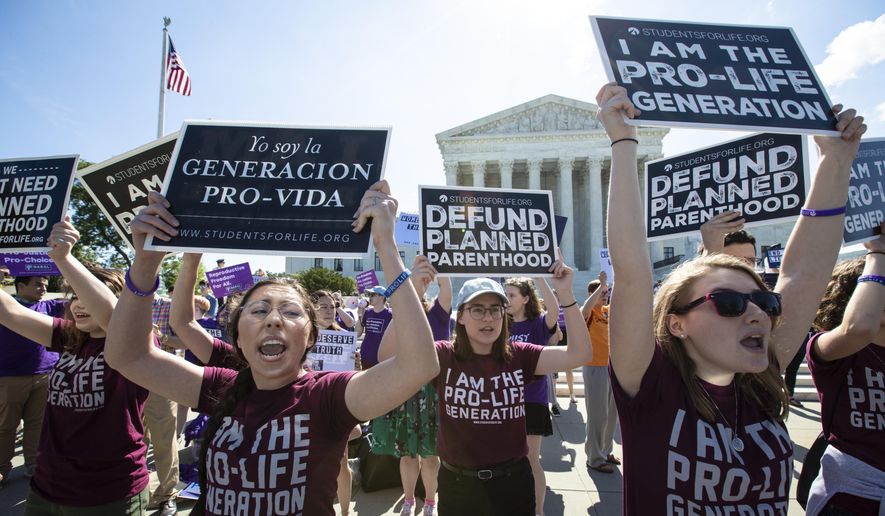The abortion debate is shaping up to play a greater-than-normal role in voter turnout in the 2022 midterms, with mobilization efforts already ramping up on both sides of the issue.
In light of the six-week abortion ban passed in Texas, upcoming hearings on the issue at the Supreme Court, and debate over the Hyde Amendment in Congress, the perennial issue is reemerging as a major catalyst.
“We think this will be the single most important issue of next year’s midterms, and we believe that it’s going to mobilize people on both sides,” said Brian Burch, president of CatholicVote.org.
Abortion has been a polarizing issue in elections since Roe v. Wade, the 1973 Supreme Court ruling that gave women the right to pursue an abortion without government interference.
Last weekend, the Women’s March organized its annual demonstration in Washington and other cities across the country, zeroing in this year on reproductive rights.
“We are witnessing the most dire threat to abortion access in our lifetime,” the Women’s March Network noted on its website, citing the Supreme Court’s refusal to block the Texas law. “We need to send an unmistakable message about our fierce opposition to restricting abortion access and overturning Roe v. Wade before it’s too late.”
The high court is preparing to hear the case on Dec. 1 of a Mississippi law that bars most abortions after 15 weeks, while the impact of the Texas law remains fresh on the minds of activist groups.
The Biden administration urged the Supreme Court last week to uphold Roe and to invalidate the Mississippi law.
The administration’s legal brief said overturning Roe “would harm women (and their partners) who have organized intimate relationships and made choices that define their views of themselves and their places in society, in reliance on the availability of abortion in the event that contraception should fall.”
A federal judge last week ordered Texas to suspend its abortion law, calling it an “offensive deprivation” of a constitutional right. The state is appealing the ruling.
Abortion also is vexing House Democrats over whether to include the Hyde Amendment, which bars federal funding for abortions, in their $3.5 trillion social spending bill. Holdout Sen. Joe Manchin III of West Virginia, a moderate Democrat, has called it a “red line” and insists he won’t vote for the package unless Hyde is included.
Joshua Wilson, a political science professor at the University of Denver, said the response toward abortion rights grew with former President Donald Trump’s three appointments to the Supreme Court, which caused increased mobilization efforts on the left.
“This all comes down to the Trump years and reconfiguration of the U.S. Supreme Court because you now have a supermajority of conservative justices on the court,” Mr. Wilson said. “That changes the political calculation for Democrats, and so now there’s a kind of concrete issue and threat to mobilize in response to it.”
Sam Lau, a spokesman for the abortion-rights advocates at Planned Parenthood Action Fund, said the organization is preparing to launch a grassroots coalition next year to encourage voters to turn out at the ballot box.
Mr. Lau noted that the timing of the Texas law, in addition to the Supreme Court hearing a case on Mississippi’s attempts to overturn Roe v. Wade, will give the issue heightened importance in the midterms.
“Abortion has been virtually inaccessible in Texas for more than a month now, and I think as people see more and more the patient impact of this really heinous abortion ban, they are getting more and more motivated and more and more energized,” Mr. Lau said.
A majority of Americans disagreed with key elements of the Texas law, according to an NPR/PBS NewsHour/Marist survey in September.
The poll found that 6 in 10 Americans opposed a ban on abortions after cardiac activity is detected, which occurs about six to eight weeks into a pregnancy.
The opposition came from 59% of Republicans, 61% of Democrats and 53% of independents.
The survey was conducted among 1,220 adults from Sept. 20 to 26 and had an error margin of +/- 3.4%.
A separate survey by the nonpartisan Pew Research Center found that more Americans were in favor of keeping abortion legal in all or most cases, compared to those who oppose it.
The April survey found that 59% of U.S. adults said abortion should be legal in all or most cases, while 39% said it should be illegal in all or most cases. The poll was conducted between April 5 and 11 with 5,109 respondents. It had an error margin of +/-2.1%.
Despite the numbers, Mr. Wilson said that historically, pro-life advocates have had more success in turning voters because their goals are clearer.
“It’s much easier to mobilize anti-abortion voters because they’re actively trying to pursue something,” Mr. Wilson said. “On the other side, until recently, there’s been kind of a complacency around the security of abortion rights or abortion access, so it’s harder to kind of specify why this should be a top issue for Democratic voters.”
Mallory Quigley, spokeswoman for the pro-life Susan B. Anthony List, said it’s a “critical moment” for those against abortion, which she predicted will be a top issue for voters next year.
She cited the need to push back against pro-choice Democrats, who control the White House and both chambers of Congress.
“All of this is generating a much-needed national conversation on abortion in our country,” Ms. Quigley said. “For the pro-life movement, this means we have the best opportunity in nearly 50 years to not only see through it, but see to it that laws that are passed are actually enacted and enforced and, therefore, lives are saved.”
• Mica Soellner can be reached at msoellner@washingtontimes.com.




Please read our comment policy before commenting.